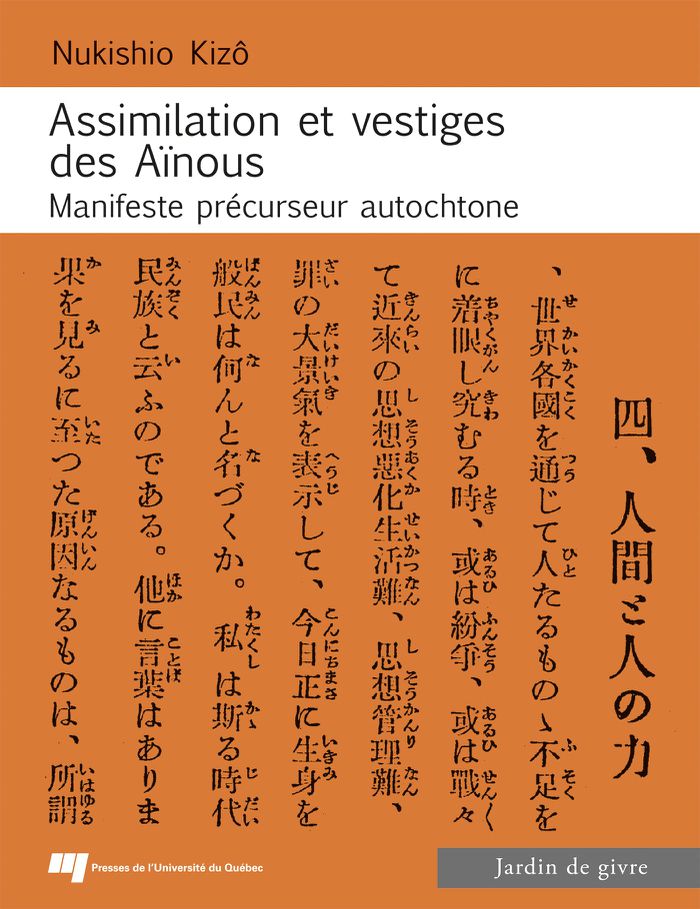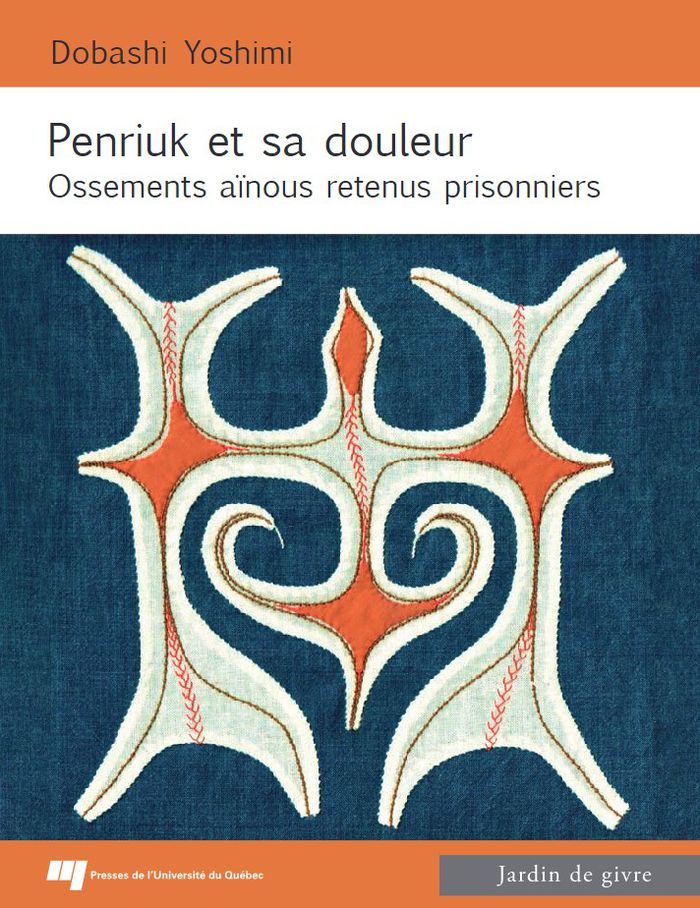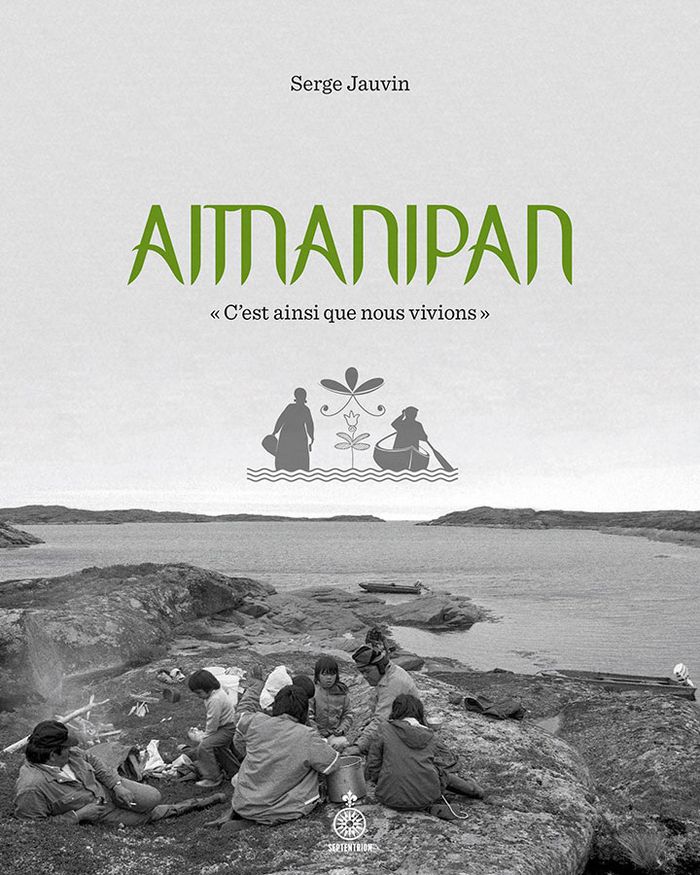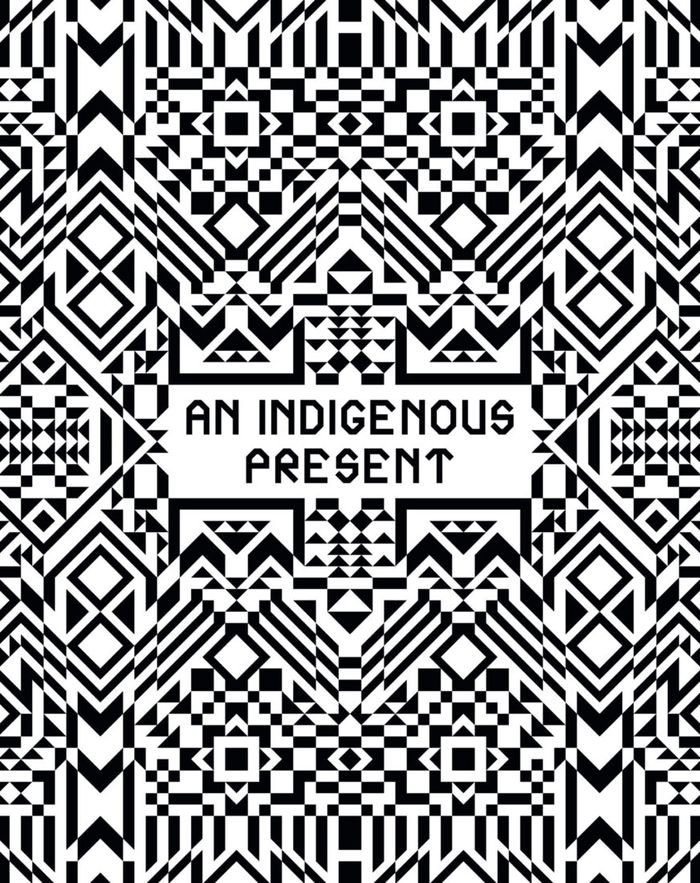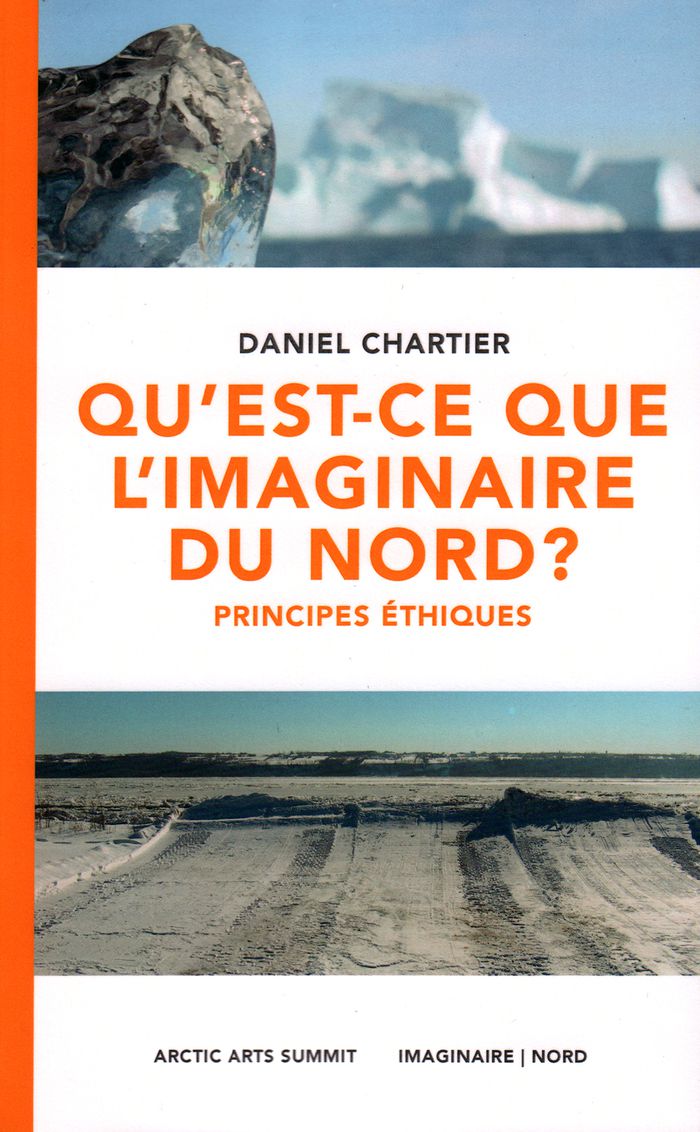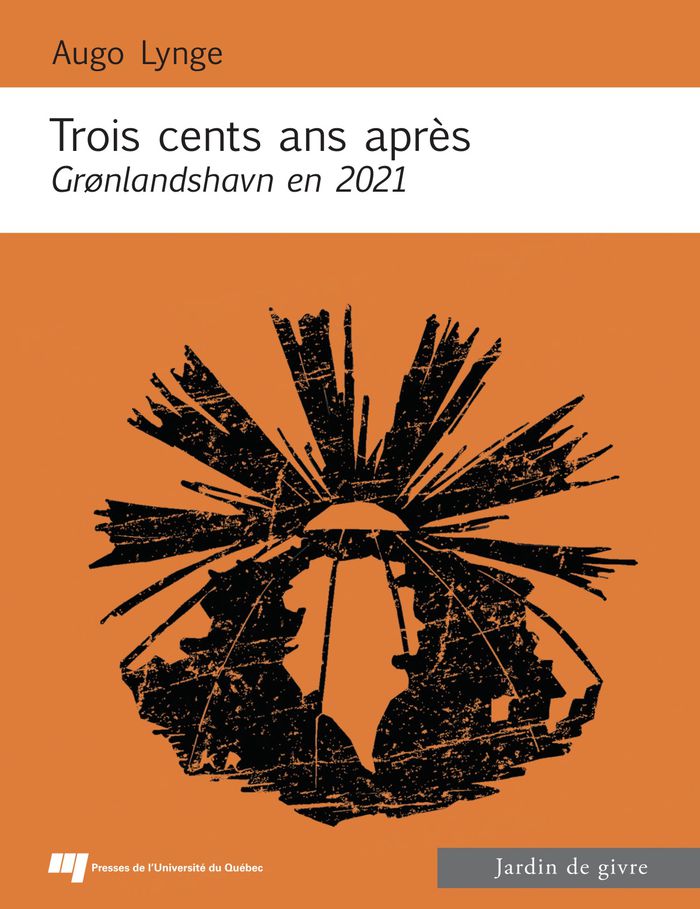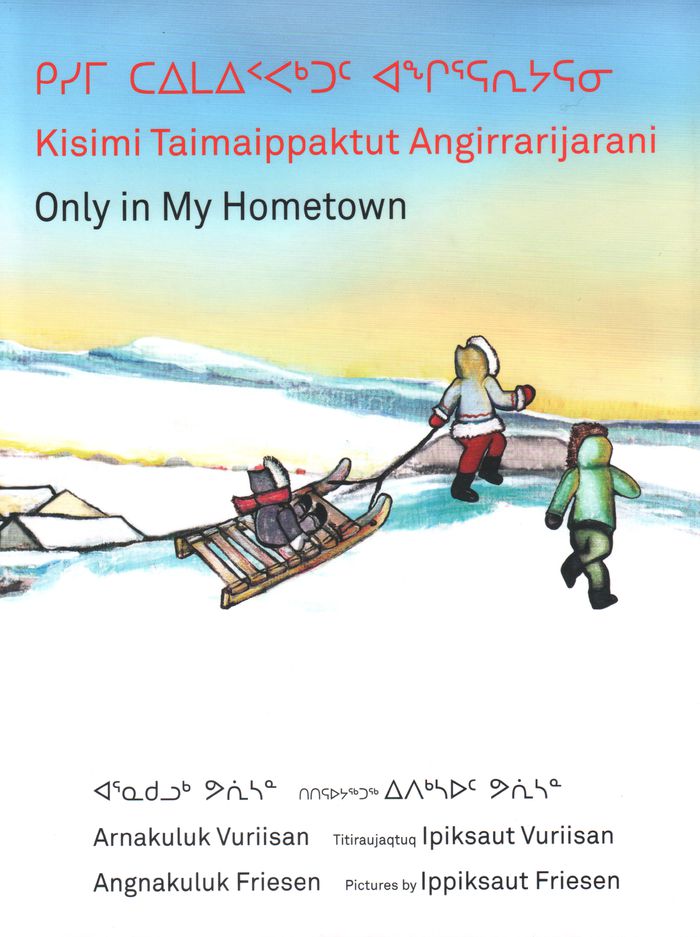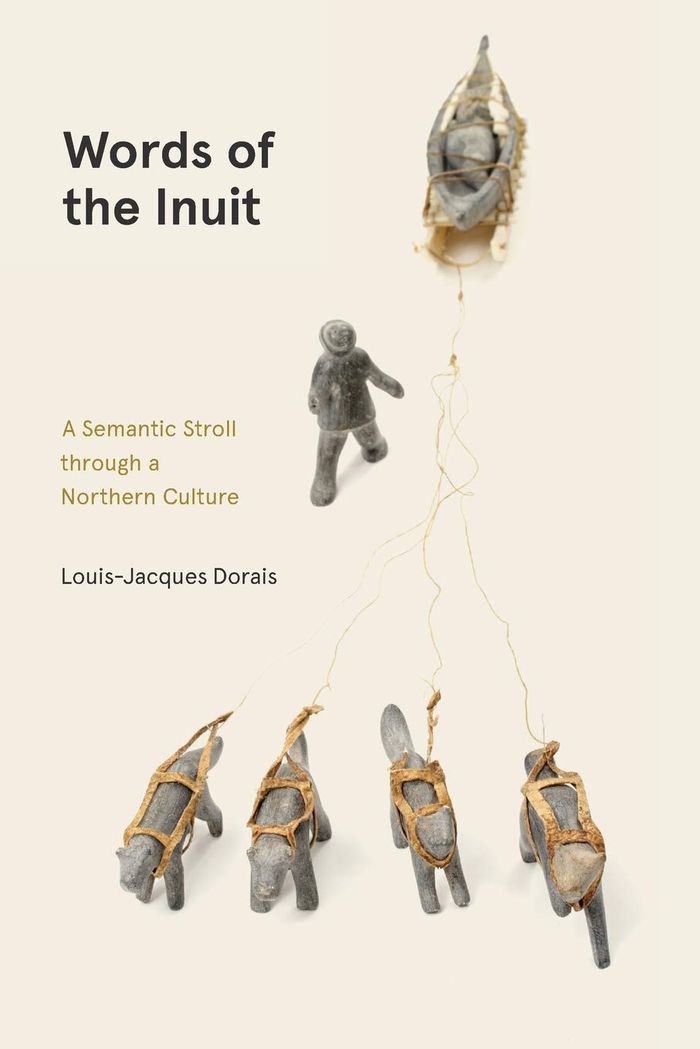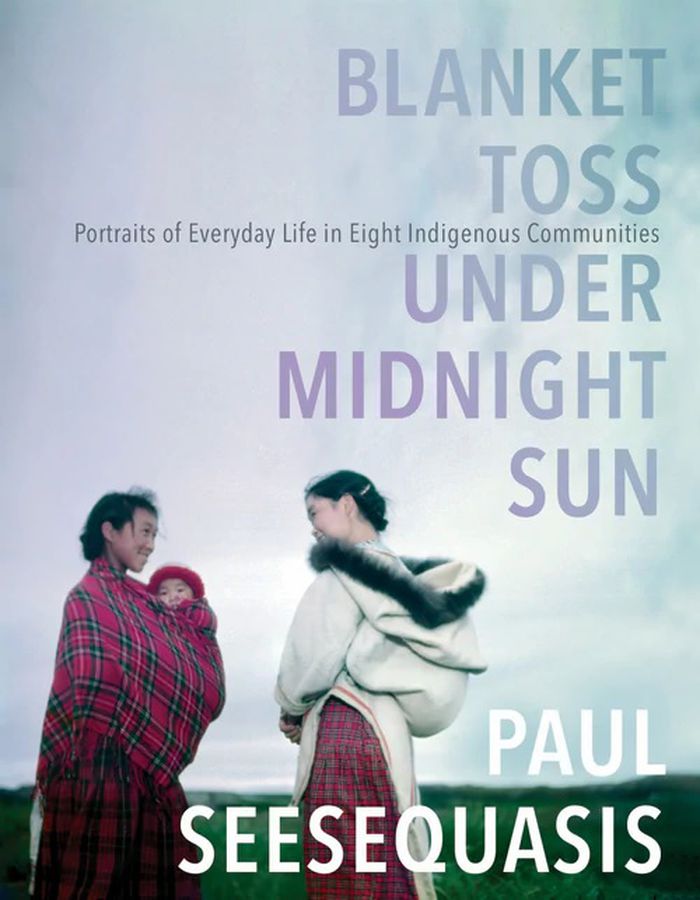$26.00
(available in store)
Summary:
Personnage fascinant et méconnu, Nukishio Kizô est un précurseur du militantisme autochtone. Figure intellectuelle de la lutte pour l'émancipation, il a montré que la situation délicate dans laquelle était plongé le peuple aïnou n'était due qu'aux contraintes de toutes sortes qui lui étaient imposées. Alors qu'il n'avait que 27 ans, il publie en 1934 le présent essai qui(...)
Assimilation et vestiges des Aïnous - Manifeste précurseur autochtone
Actions:
Price:
$26.00
(available in store)
Summary:
Personnage fascinant et méconnu, Nukishio Kizô est un précurseur du militantisme autochtone. Figure intellectuelle de la lutte pour l'émancipation, il a montré que la situation délicate dans laquelle était plongé le peuple aïnou n'était due qu'aux contraintes de toutes sortes qui lui étaient imposées. Alors qu'il n'avait que 27 ans, il publie en 1934 le présent essai qui témoigne de la situation des Aïnous au sein de l'Empire japonais et des politiques assimilationnistes dont ils subissent les effets. Il appelle les siens à se ressaisir pour éviter la dépossession de leurs terres natales, la disparition de leur langue, de leur culture et de leurs droits. Il dénonce la discrimination à laquelle les Aïnous doivent faire face, inscrite dans les discours et les lois japonaises. Pour les lecteurs d'aujourd'hui, cet essai apparaît comme l'une des premières dénonciations écrites de l'état de fait colonial contre un peuple autochtone, rédigée et publiée par un Autochtone. Sous son ton rationnel et modéré, Nukishio Kizô livre ainsi un témoignage troublant, mais il lance aussi un appel à la survie et à la reconnaissance. Avec une présentation de Daniel Chartier, une introduction, une chronologie et des notes de Lucien-Laurent Clercq.
indigenous
$26.00
(available in store)
Summary:
Pendant une centaine d’années, des universitaires ont exhumé, profané, transporté, étudié et conservé aux fins de «recherches scientifiques» les restes ancestraux d’Aïnous. On estime que plus de 1 600 personnes ont ainsi été à titre posthume victimes de ce programme. La présente œuvre poétique témoigne de la douleur causée par le colonialisme dont ont été victimes les(...)
Penriuk et sa douleur - Ossements aïnous retenus prisonniers
Actions:
Price:
$26.00
(available in store)
Summary:
Pendant une centaine d’années, des universitaires ont exhumé, profané, transporté, étudié et conservé aux fins de «recherches scientifiques» les restes ancestraux d’Aïnous. On estime que plus de 1 600 personnes ont ainsi été à titre posthume victimes de ce programme. La présente œuvre poétique témoigne de la douleur causée par le colonialisme dont ont été victimes les Autochtones, mais aussi des limites de l’ouverture du monde: aujourd’hui encore on retrouve à Sapporo un bâtiment lugubre où sont conservés, «retenus prisonniers», comme l’écrit Dobashi Yoshimi, les restes de son ancêtre Penriuk, grand chef aïnou. Avec une présentation de Daniel Chartier, une introduction de Jeffry Gayman, une préface de Hanazaki Kôhei et une chronologie de Lucien-Laurent Clercq. Traduit du japonais par Etienne Lehoux-Jobin.
indigenous
$60.00
(available in store)
Summary:
Au début des années 1980, alors qu'il était jeune photographe, Serge Jauvin a passé un long séjour chez les Innus d'Unamen Shipu (La Romaine) dans la famille d'Hélène et de William-Mathieu Mark. Il a reçu d'eux le témoignage exceptionnel de leur passage du nomadisme à la sédentarité et l'a documenté à travers son journal et ses photographies. Cela lui a permis d'illustrer(...)
Aitnanipan : « C'est ainsi que nous vivions »
Actions:
Price:
$60.00
(available in store)
Summary:
Au début des années 1980, alors qu'il était jeune photographe, Serge Jauvin a passé un long séjour chez les Innus d'Unamen Shipu (La Romaine) dans la famille d'Hélène et de William-Mathieu Mark. Il a reçu d'eux le témoignage exceptionnel de leur passage du nomadisme à la sédentarité et l'a documenté à travers son journal et ses photographies. Cela lui a permis d'illustrer à la fois la vie dans la communauté et celle sur le Nutshimit, le territoire ancestral. Ce récit sur les derniers nomades de la Côte-Nord n'est pas le regard extérieur d'un étranger. Au contraire, il constitue un témoignage intime du savoir-être et du savoir-faire innu. Il est une empreinte indélébile qui témoignera aux générations futures de la contribution d'un peuple millénaire de l'Amérique septentrionale «qui vivait ainsi».
indigenous
An indigenous present
$108.50
(available to order)
Summary:
This volume is a gathering of Native North American contemporary artists, musicians, filmmakers, choreographers, architects, writers, photographers, designers and more. Conceived by Jeffrey Gibson, a renowned artist of Mississippi Choctaw and Cherokee descent, ''An Indigenous present'' presents an increasingly visible and expanding field of Indigenous creative(...)
September 2023
An indigenous present
Actions:
Price:
$108.50
(available to order)
Summary:
This volume is a gathering of Native North American contemporary artists, musicians, filmmakers, choreographers, architects, writers, photographers, designers and more. Conceived by Jeffrey Gibson, a renowned artist of Mississippi Choctaw and Cherokee descent, ''An Indigenous present'' presents an increasingly visible and expanding field of Indigenous creative practice. It centers individual practices, while acknowledging shared histories, to create a visual experience that foregrounds diverse approaches to concept, form and medium as well as connection, influence, conversation and collaboration. ''An Indigenous present'' foregrounds transculturalism over affiliation and contemporaneity over outmoded categories.
$20.00
(available in store)
Summary:
Le Nord est un espace imaginé et représenté depuis des siècles par les artistes et les écrivains du monde occidental, ce qui a mené, au fil du temps et de l'accumulation successive de couches de discours, à la création d'un « imaginaire du Nord » - que ce Nord soit celui de la Scandinavie, du Groenland, de la Russie ou du Grand Nord, ou encore des pôles. Or les(...)
Qu'est-ce que l'imaginaire du Nord ?
Actions:
Price:
$20.00
(available in store)
Summary:
Le Nord est un espace imaginé et représenté depuis des siècles par les artistes et les écrivains du monde occidental, ce qui a mené, au fil du temps et de l'accumulation successive de couches de discours, à la création d'un « imaginaire du Nord » - que ce Nord soit celui de la Scandinavie, du Groenland, de la Russie ou du Grand Nord, ou encore des pôles. Or les Occidentaux ont atteint le Pôle Nord il n'y a qu'un siècle, ce qui fait du « Nord » le produit d'un double regard, de l'extérieur – les représentations, surtout occidentales – et de l'intérieur – les cultures nordiques (inuites, scandinaves, cries, etc.). Les premières étant souvent simplifiées et les secondes méconnues, si l'on souhaite étudier le « Nord » dans une perspective d'ensemble, nous devons donc poser deux questions : comment définir le Nord par l'imaginaire ?
indigenous
Trois cents ans après
$18.00
(available in store)
Summary:
En lisant ce roman, le deuxième de la littérature groenlandaise, le lecteur découvrira la vision de l’avenir de l’Arctique en 2021 telle qu’imaginée en 1931 par Augo Lynge, auteur né à Qeqertarsuatsiaat. Selon Per Kunuk Lynge, qui en signe l’avant-propos, «?à la lecture de ses anticipations, dont certaines se sont réalisées longtemps après la publication de son roman, on(...)
Trois cents ans après
Actions:
Price:
$18.00
(available in store)
Summary:
En lisant ce roman, le deuxième de la littérature groenlandaise, le lecteur découvrira la vision de l’avenir de l’Arctique en 2021 telle qu’imaginée en 1931 par Augo Lynge, auteur né à Qeqertarsuatsiaat. Selon Per Kunuk Lynge, qui en signe l’avant-propos, «?à la lecture de ses anticipations, dont certaines se sont réalisées longtemps après la publication de son roman, on ne peut s’empêcher de voir en l’auteur le chaman inuit d’autrefois, qui voyageait librement autour du monde et était capable de prédire l’avenir?». La vision que nous offre Lynge dans cette intrigue policière entre les villages et l’immense inlandsis glacé est celle d’un pays technologiquement avancé et socialement serein, où les personnages inuits sont devenus ce que sont les Groenlandais d’aujourd’hui?: une preuve vivante d’un peuple qui a la capacité de «?s’adapter à l’un des climats les plus froids et les plus rudes de la planète?» tout en conservant sa langue et sa culture.
indigenous
$22.00
(available in store)
Summary:
This book explores the parallels between safeguarding the Arctic and the survival of Inuit culture, of which the author's own background is such an extraordinary example. This is a human story of resilience, commitment, and survival told from the unique vantage point of an Inuk woman who, in spite of many obstacles, rose from humble beginnings in the Arctic to become one(...)
The right to be cold: One woman's story of protecting her culture
Actions:
Price:
$22.00
(available in store)
Summary:
This book explores the parallels between safeguarding the Arctic and the survival of Inuit culture, of which the author's own background is such an extraordinary example. This is a human story of resilience, commitment, and survival told from the unique vantage point of an Inuk woman who, in spite of many obstacles, rose from humble beginnings in the Arctic to become one of the most influential and decorated environmental, cultural, and human rights advocates in the world.
indigenous
$18.95
(available in store)
Summary:
Sisters Angnakuluk Friesen and Ippiksaut Friesen collaborate on this story about what it’s like to grow up in an Inuit community in Nunavut. Every line about the hometown in this book will have readers thinking about what makes their own hometowns unique. With strong social studies curriculum connections, this book introduces young readers to life in the Canadian North,(...)
May 2017
Kisimi Taimaippaktut Angirrarijarani / Only in My Hometown
Actions:
Price:
$18.95
(available in store)
Summary:
Sisters Angnakuluk Friesen and Ippiksaut Friesen collaborate on this story about what it’s like to grow up in an Inuit community in Nunavut. Every line about the hometown in this book will have readers thinking about what makes their own hometowns unique. With strong social studies curriculum connections, this book introduces young readers to life in the Canadian North, as well as the Inuit language and culture. Angnakuluk’s simple text, translated into Inuktitut and written out in syllabics and transliterated roman characters, is complemented by Ippiksaut’s warm paintings of their shared hometown.
$31.95
(available in store)
Summary:
"Words of the Inuit" is an important compendium of Inuit culture illustrated through Inuit words. It brings the sum of the author’s decades of experience and engagement with Inuit and Inuktitut to bear on what he fashions as an amiable, leisurely stroll through words and meanings. Inuit words are often more complex than English words and frequently contain small units of(...)
Words of the Inuit: A semantic stroll though a northern culture
Actions:
Price:
$31.95
(available in store)
Summary:
"Words of the Inuit" is an important compendium of Inuit culture illustrated through Inuit words. It brings the sum of the author’s decades of experience and engagement with Inuit and Inuktitut to bear on what he fashions as an amiable, leisurely stroll through words and meanings. Inuit words are often more complex than English words and frequently contain small units of meaning that add up to convey a larger sensibility. Dorais’ lexical and semantic analyses and reconstructions are not overly technical, yet they reliably evince connections and underlying significations that allow for an in-depth reflection on the richness of Inuit linguistic and cultural heritage and identity. An appendix on the polysynthetic character of Inuit languages includes more detailed grammatical description of interest to more specialist readers. Organized thematically, the book tours the histories and meanings of the words to illuminate numerous aspects of Inuit culture, including environment and the land; animals and subsistence activities; humans and spirits; family, kinship, and naming; the human body; and socializing with other people in the contemporary world. It concludes with a reflection on the usefulness for modern Inuit- especially youth and others looking to strengthen their cultural identity- to know about the underlying meanings embedded in their language and culture. With recent reports alerting us to the declining use of the Inuit language in the North, "Words of the Inuit" is a timely contribution to understanding one of the world’s most resilient Indigenous languages.
indigenous
$32.95
(available to order)
Summary:
In 2015, writer and journalist Paul Seesequasis found himself grappling with the devastating findings of Canada's Truth and Reconciliation Commission report on the residential school system. He sought understanding and inspiration in the stories of his mother, herself a residential school survivor. Gradually, Paul realized that another, mostly untold history existed(...)
Blanket toss under midnight sun
Actions:
Price:
$32.95
(available to order)
Summary:
In 2015, writer and journalist Paul Seesequasis found himself grappling with the devastating findings of Canada's Truth and Reconciliation Commission report on the residential school system. He sought understanding and inspiration in the stories of his mother, herself a residential school survivor. Gradually, Paul realized that another, mostly untold history existed alongside the official one: that of how Indigenous peoples and communities had held together during even the most difficult times. He embarked on a social media project to collect archival photos capturing everyday life in First Nations, Metis and Inuit communities from the 1920s through the 1970s. As he scoured archives and libraries, Paul uncovered a trove of candid images and began to post these on social media, where they sparked an extraordinary reaction. Friends and relatives of the individuals in the photographs commented online, and through this dialogue, rich histories came to light for the first time. ''Blanket toss under midnight sun'' collects some of the most arresting images and stories from Paul's project. While many of the photographs live in public archives, most have never been shown to the people in the communities they represent. As such, ''Blanket Toss'' is not only an invaluable historical record, it is a meaningful act of reclamation, showing the ongoing resilience of Indigenous communities, past, present--and future.
indigenous
